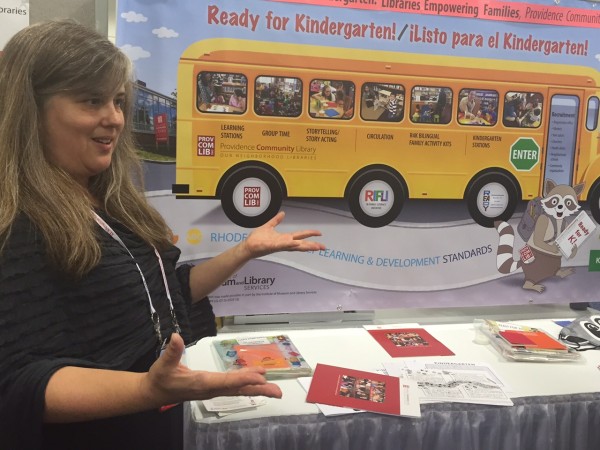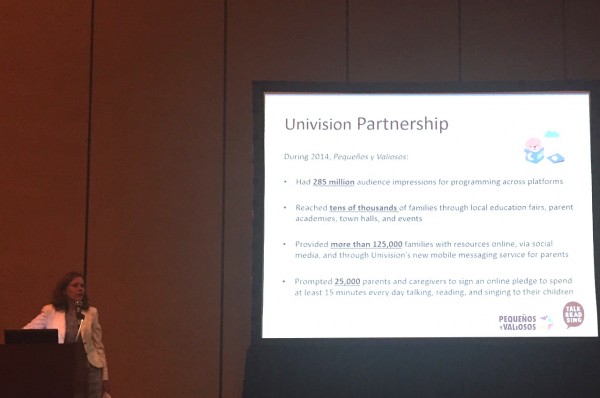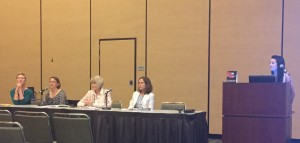Early Learning and "Law & Order"
Greater outreach and a holistic approach to early learning characterizes initiatives such as Too Small to Fail, which seeks to place literacy-positive images in prime-time TV shows. A far-reaching outward focus is taking hold in library programs as well.

At the 2015 ALA Annual Conference in San Francisco, Cheryl Space from Providence Community Library talks about prekindergarten outreach and programming designed to help families increase school preparedness.
In school climates where even the youngest students are being assessed, evaluated, and tracked based on skills attainment, public libraries are finding new ways to reach out to families and work toward the critical goal of school readiness. The language gap that develops between children in lower-income households and those of more economically advantaged peers has been well documented. These days, Early learning initiatives go far beyond storytime. Two programs highlighted at the 2015 American Library Association Annual Conference in San Francisco offered unconventional approaches to early learning and targeting families outside the traditional library user population.Babies Need Words Every day
The Association for Library Service to Children (ALSC) public service campaign, “Babies Need Words Every Day: Talk, Read, Sing, Play,” is structured as a simple and affordable intervention to encourage age-appropriate language development in the youngest children by cultivating the abilities of parents and caregivers to offer critical literacy support. A series of eight colorful posters with art by illustrator Il Sung Na provides easy-to-implement, immediate activities involving rhymes, songs, and play, designed to spark deliberate interaction in ways that build language acquisition. The initiative provides template press releases and letters to the editor that libraries can easily customize to reach media outlets in their area. An ALSC Sunday afternoon panel on this topic at ALA, Babies Need Words Every Day: Bridging the Word Gap as a Community, was made up of partner organizations and emphasized the synergy among groups and how cross-promotion can work on both hyper-local and national levels. Leading the panel was Patti Miller from the Clinton Foundation initiative Too Small to Fail. Miller said that her organization advocates to include messages about reading in TV programs, with actors modeling the type of behavior they want to see parents engaging in with children. They have had success with six prime time shows, including Law & Order: Special Victims Unit and The Fosters. Their next efforts target daytime games shows, talk shows, and soap operas, said Miller, as well a faith-based strategy to raise awareness of the importance of early childhood learning among trusted figures including ministers and pastors.
Patti Miller of Too Small to Fail discussed partnerships during a Sunday afternoon ALA panel.
Harnessing mobile technology to close the word gap, TSTF partnered with Text4Baby, a free mobile service for pregnant women and new mothers reaching one million subscribers. In January, Text4Baby began including literacy content in the form of tips that were created by Sesame Street. The project is also trying to delve into more specific actionable guidance by embedding local messages in pilot programs in Oakland, CA, and Tulsa, OK, sites of concentrated community-wide campaigns.
Too Small to Fail's Patti Miller and panel participants from local California libraries and agencies.
TSTF has also designed public service messages to lead to real behavior shifts, believing that campaigns like those promoting the use of seatbelts were effective because they used media partners to magnify awareness. They have partnered with Univision, the leading television company for Hispanic America. Univision decided to employ a cross-platform campaign, involving news segments, community fairs, and social media, using text message for parents to pledge to read to children for 15 minutes a day, an effort that netted 40,000 participants. Miller estimates the Univision partnership has produced the 285 million audience impressions. Find more about easy ways to close the word gap on the ALSC website, including downloadable posters, booklists, and talking points.Ready for Kindergarten!
Intensive preparation the summer before formal schooling begins is the focus of Ready for Kindergarten! (RFK), Providence (RI) Community Library’s project supported by an Institute of Museum and Library Services (IMLS) National Leadership Grant. The library’s youth service coordinator, Cheryl Space, showcased the initiative, beginning with the project rationale, at ALA during the Sunday panel Getting Kids Ready for Kindergarten: Libraries Empowering Families. “It’s designed for families whose children are not in a formal preschool setting,” Space said. “Approximately 50 percent of the 1,800 kids who go to kindergarten in Providence have not had any preschool experience at all. We purposefully hold this in the morning or the early afternoon so we reach the kids who are not in school, who might be home with grandma or mom.” Outreach to the pre-K community begins with support for school registration in the spring. The library staffs a table at the schools and greets families as they are coming in to register. Library staff also had access to registration information and called families whose children hadn’t been to preschool on the phone. “It’s one-to-one outreach,” Space described. “Also, one of our librarians was super successful going into hair salons, because a lot of women hang out there. She asked [the staff] to tell the moms that come in about our program. And churches, health clinics—we put flyers everywhere.” “’Congratulations. Please register your child for a free weekly program,’” Space read from one of her promotions. “A lot of them think it’s not a choice.”Story Acting for Literacy
This year, RFK reached 90 children across eight libraries. The library sessions begin with 45 minutes of play while the library staff greets and interacts with parents and caregivers. After the independent play, group activities include repeated routines across sessions to acclimatize children to group experiences. “We try to sing the same songs, use the same greetings, talk about the weather,” Space said. “The idea is, the adults are right there,” she continued. “We’re providing a fun experience for the children, and an enriching experience, but what we really want to do is affect what’s happening at home. We want to show them activities they can do they might not have considered. We want to encourage them to read and share books.” Another big element of the program is Storytelling and Story Acting, techniques developed by educator Vivian Paley. “One of our librarians has a spiral bound notebook and a pencil, and she walks around [and] asks the kids if they have a story for me today,” Space said. ”You write it down verbatim so they actually see you writing the words. It develops so many skills. Then you read it to them and ask, ‘Is there anything more you want me to say?’ There’s a one-page limit.” The library staff reads the dictated stories out loud during group time, and the kids are offered the opportunity to act out parts with parents watching. “When it’s their child’s story being acted out, they’re just beaming,” said Space. “A lot of the kids may be really shy, but by the end, they’re telling stories.” The nine-week program includes access to 15 kits containing the same books in English and Spanish and other items, including an activity card designed to encourage conversation and reflection. In one example, children help create a shopping list. “They consider this their homework,” Space says, noting that about half the participating children speak Spanish at home.. “It cost us just under $2,000 to set up this library,” said Space. “This is meant to be on a shoestring. We’ve boiled it down to what we can keep on [doing].” Wendy Stephens is the librarian at Cullman High School in Cullman, AL. She has a Ph.D. in Information Science and National Board Certification in Library Media.
Wendy Stephens is the librarian at Cullman High School in Cullman, AL. She has a Ph.D. in Information Science and National Board Certification in Library Media. RELATED
RECOMMENDED
CAREERS
The job outlook in 2030: Librarians will be in demand
CAREERS
The job outlook in 2030: Librarians will be in demand
ALREADY A SUBSCRIBER? LOG IN
We are currently offering this content for free. Sign up now to activate your personal profile, where you can save articles for future viewing






Add Comment :-
Comment Policy:
Comment should not be empty !!!
Deirdre
Can you have the link to the downloadable posters fixed it is giving a 404 error thxPosted : Jul 08, 2015 10:24